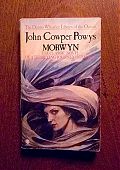
John Cowper Powys
Morwyn
The Vengeance of God
Morwyn is not a good book yet it’s not a bad book either. A strange book; a book I only suggest to previous readers and enjoyers of John Cowper Powys. Morwyn is a crystallization of his eccentricities, a portrait of a fanatic, fantastic mind.
It is exactly John Cowper Powys’ eccentricities and fanatic leanings which pull me to him as a writer. One never knows what’s coming next, especially in this novel, as it takes place in Hell. Like books which employ personifications of the devil so any illustration of that place of perdition is more than welcome: you’ve got to admit, it’s more fun than Heaven! As the cover of Morwyn self-proclaims: The classic novel of a terrifying journey into Hell.
Now, I wouldn’t call Morwyn “classic,” nor would I call it “terrifying.” It is sometimes funny and at times exhausting to follow on for paragraphs the exigencies of Morwyn’s “maddening figure.” Her little girl ankles, her slender legs, her purity and chastity and virginity, what have you. On and on, so that even when the nameless Captain has found himself and Morwyn and his dog, Black Peter, in a desperate life-threatening situation, he always has time to stare and contemplate the nature of his attraction.
Like many other characters created by John Cowper Powys—and like John Cowper Powys himself—the Captain finds in Morwyn his ideal nymphette, or sylph. The Captain describes Morwyn with the emotion’s of a woman then as wavering to the passivity of a little girl, so that one can almost visualize the battle going on in this retired man’s mind. So often I found myself sure through his descriptions, that he had fallen in love with a twelve year old. She only looks twelve, but she’s really eighteen!
Morwyn’s father was a famous vivisector. When on the abrupt descent into Hell, he died and became a vivisector ghost among other ghostly vivisectors. A long discourse on anti-vivisection composes the bulk of this book.
… it was clearly a characteristic of Hell to bring out into the open and enlarge upon, as if under a magnifying glass, all the lesser, as well as the greater, abominations of our earthly life.
Torture for Science (knowledge and longevity) and torture for Religion (salvation) are the only two direct routes to Hell. Outside of the usual life-and-death struggle these two cruelties exist. They are rationalized cruelties, thought out, performed in the name of progress and the saving of lost souls. Honestly I never thought much about vivisection before reading this book and now perhaps I’ve read too much. John Cowper Powys was so passionately against vivisection that he felt the need to write this tract and disguise it as a novel.
It is a work of fiction, with characters such as Torquemada and the Marquis de Sade, with an imaginative depiction of Hell much more pleasant than Joyce’s. But it is a novel which wants desperately to get a point across. Sometimes that desperation is way too much, for how many times and in how many ways can you say that vivisection is bad without repeating yourself? But then, just as frustration was about to consume me, I always stumbled on a gem of a John Cowper Powys’ thought:
It’s extraordinary how deceptive the mere fact of being alive makes us! Everything living, everything healthy and sound and natural, blooms like a flower with illusion and pretense!
Usually John Cowper Powys is a man of many words. At least Morwyn is relatively short!
· · · · · · · · · · · · · · · · · · · ·